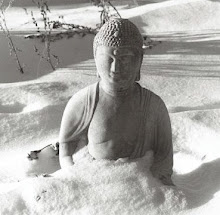
There's a single frame in a
Robert Crumb comic strip (I'll replace Mr. Natural here with it, if and when I find it) with a close-up of a typically bugged-out Crumb character who seems shocked and panicky—sweating profusely, eyes popping—saying, "
I...I just realized. Everything is cosmic!" Yes! There's no place more cosmic than right where you are, no activity more cosmic than what you do each moment. How could there be? There's no place more enlightened than this place, no moment more enlightened than this moment, no Buddha more enlightened than this very person. Each one of us is, dude,
way cosmic. We are fundamentally without bounds, without definition, ungraspable, birthless, deathless. Walt Whitman said: "I am vast. I contain multitudes." The only question is: to what degree do we realize it? Can we drop the fabricated "I" who thinks I'm in here and everything else is out there?
I'll sign off with some sections from a long, mongo-cosmic poem by
Antler:
Rebecca Falls EpiphanyWe wish that benificent beings from Outer Space
would land on Earth and bring us the Vision we need
to save us from destroying the world.
We wish a spaceship would come from Outer Space
and transport us to its planet's utopia
where creatures exactly like us but enlightened
or creatures very different from us but enlightened
exist.
We wonder if some of the people we know
aren't possibly from Outer Space,
Or complete strangers of unearthly beauty
or great tender geniuses of love,
poetry, music, dance, art—
are they not emissaries from "out there"?
We wonder if possibly we are
Outer Space Reconnaissance Consciousnesses
programmed not to awake till now,
Cosmic Reconnaissance Renaissance Consciousnesses
programmed not to awake till now.
What is my Mission on this planet?
What am I here for? What am I here for?
Ding! Ding! Ding! Ding!
Suddenly we realize WE ARE FROM OUTER SPACE!
WE ARE CREATURES FROM OUTER SPACE!
EARTH IS OUR PLANET IN OUTER SPACE!
We don't have to go in a spaceship from Earth to the Moon
and take Mescaline and look back at our Earth
or walk in space after smoking
millions of joints
to realize we're in Outer Space!
We are just as much in Outer Space
wherever we are on this Planet
as we'd be on our moon
or any moon in our solar system
or any solar system in this galaxy
or any galaxy in this universe
or any universe in the pastpresentfuture!
We are as much creatures from Outer Space
as lifeforms anywhere in this galaxy
or any galaxy!
There's nowhere in the Universe
that is more in Outer Space
than we are!
We live in the Universe!
It's not "out there."
It's not just something we see in movies
to eerie music.
We don't have to read science fiction
to make love voluptuous cricketsinging nights
under all the stars.
Each of us should be as much an apparition as Bigfoot
or LochNess Monster!
Each of us should be as much an apparition as the Being
coming down the ramp of the spaceship
from "out there."
How dear this Earth becomes then!
How sacred every wild place and creature
that remains!
How insidious and lamentable the vast factory's pollution
and overpopulation disaster more disastrous
than all the dead in every human war!
How clear it becomes to us then
that no one should have to be a slave!
That everyone should be a creative genius of tender love
and loving creator of music or poetry,
painting or dance,
endless continued gentle passionate creations
of human mind!
Behold the lilies, they neither spin nor sew!
Think of the whales! They don't punch timeclocks!
They don't need Christ or Buddha
to be enlightened.
Everyone's life should be devoted to enlightenment!
Ah, I feel the key, for me, to perceiving, entertaining,
and embodying Infinite Space and Eternal Time's
Ultimate Implications
is to be found in the deepest solitude I can find
in the non-human Manifestation of Cosmos
in that realm called Wilderness Reality.
What does Contemporary Poetry Scene in America
have to do with this?
Do I live in America?
Do people who are dead continue to argue
whether there is life after death?
This is Heaven!
I don't have to die
to be Immortal!
I don't have to die
to be in Eternity!
To feel in this flash of existence
in the Antler form
the unending Amaze!
O Poets are Emissaries from Outer Space
descending their spaceship ramps
and their visionary message to Earth
shall be heard around the world!
 Because cross-country skiing exists, there is non-cross-country skiing. Because poetry exists, there is non-poetry. Because breathing in exists, there is breathing out. Because hatred exists, there is compassion. Because greed exists, there is generosity. Because birth exists, there is the unborn. Because death exists, there is no-death. Because the self exists, there is no-self.
Because cross-country skiing exists, there is non-cross-country skiing. Because poetry exists, there is non-poetry. Because breathing in exists, there is breathing out. Because hatred exists, there is compassion. Because greed exists, there is generosity. Because birth exists, there is the unborn. Because death exists, there is no-death. Because the self exists, there is no-self. 




_3.jpg)






